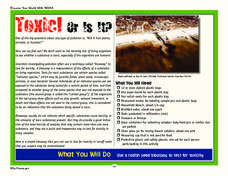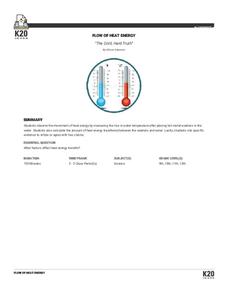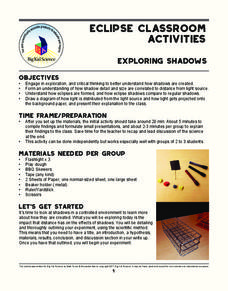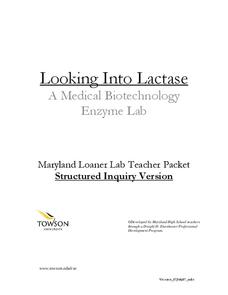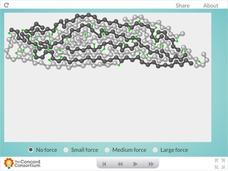Missouri Department of Elementary
Conflict Mediation – Part 2: Practice
A lesson challenges scholars to prove their understanding of conflict mediation. Small groups role-play scenarios using two mediators and two disputants. Peers observe then discuss their findings. A worksheet outlines groups'...
Missouri Department of Elementary
Conflict Mediation – Part 1: Getting Ready
Two scholars walk into a room arguing, what is happening? Peers observe the two actors in preparation for a whole-class discussion about conflict. Learners establish a conflict, name the three approaches—passive, aggressive, and...
Curated OER
Applied Science - Science and Math Lab 4B
Learners experiment with the combination of vinegar and baking soda. In this applied science lesson, future scientists compare qualitative and quantitative data collected from their exploration. Then they work together to analyze and...
PBS
Blow the Roof Off!
Blow the minds of young scientists with this collection of inquiry-based investigations. Based on a series of eight videos, these "hands-on, minds-on" science lessons engage young learners in exploring a wide range of topics...
Learning for Life
Exhibition Responsible Citizenship
While we hope our children may never have to witness a crime firsthand, give them the tools to recognize what is happening and respond accordingly. These activities help learners sharpen their observation and memory skills, as well...
NOAA
Toxic! Or Is It?
Super scientists tests the toxicity of water using radish seed bioassays. Over the course of five days, scholars observe the germination process of several radish seeds, looking closely at their roots to determine the level of toxins...
Curated OER
Fishy Behavior
Here's a lab that may make you rethink that morning cup of coffee. Biology scholars test the effects of caffeine, alcohol, and nicotine on the behavior of zebrafish through an intriguing experiment. Learners observe fish...
K20 LEARN
The Cold, Hard Truth
Things are really getting heated in the lab! Science scholars scope out the facts about heat energy transfer using a simple lab from the K20 Center. Groups collaborate to observe temperature changes between hot metal and water, then use...
Chemistry Collective
Virtual Lab: Cobalt Chloride and Le Chatelier’s Principle
Colorful cobalt complexes make a great way to learn about Le Chatelier! Eager chemists explore equilibrium through a virtual lab. Individuals use solutions with two different concentrations and observe the color changes that indicate...
Academy of American Poets
Teach This Poem: "Putting in the Seed" by Robert Frost
Young botanists dig into a lesson that has them planting lima bean seeds and observing their growth. They compare their experience to that of the speaker in Robert Frost's poem, "Putting in the Seed."
Overcoming Obstacles
Understanding Nonverbal Messages
The Overcoming Obstacles course for middle schoolers continues with a unit module on communication. In the first lesson, participants engage in a series of activities that help them recognize nonverbal clues and the importance of making...
Baylor College
Needs of Plants
What better way to learn about plant life than by creating a class garden? Young botanists start with a brief discussion about radishes before planting seeds and watching them grow. To determine the importance of water,...
CK-12 Foundation
Development of Hypotheses: Pressure versus Temperature
Is it me, or is it getting hot in here? Middle school science sleuths investigate the relationship between temperature and pressure, then use their observations to form a hypothesis. Questions embedded in the interactive help guide...
Big Kid Science
Exploring Shadows
What's that lurking in the shadows? An activity that demonstrates how eclipses happen. Science scholars investigate how light and distance interact to form shadows. The experiment uses simple materials to generate data and observations...
Towson University
Looking Into Lactase: Structured Inquiry
Why is lactase important? Biology scholars explore enzyme function in a structured inquiry lab. The activity tasks lab groups with observing how temperature and pH affect enzyme activity, as well as determining which milk products...
Concord Consortium
Tire Forces
No need to tread lightly on this piece of tire rubber! Polymer science pupils observe the behavior of rubber with an interesting interactive. Users apply three different levels of force to a sample, then watch how they affect the polymer...
Nuffield Foundation
Making a Streak Plate
Cultivate bacteria with a straightforward lesson featuring agar. Scholars create a streak plate on agar to ideally create colonies of bacteria or yeast that are growing separately from each...
Teaching for Change
Selma in Pictures: Socratic Seminar
Photographs from the freedom movement in Selma, Alabama serve as the basis of two Socratic Seminars. Class members prepare for the seminars by closely observing the images, form a hypothesis, and use evidence from photo to support a...
American Museum of Natural History
Make a Terrarium
Scholars read a brief overview of what a terrarium is and how it creates the greenhouse effect, then click on a link to discover the materials and 10 steps they need to build their own.
Flipped Math
Experimental Design
Experimentally, come up with a study design. Learners hear about different types of study designs, observational studies, and experiments. They identify the subjects, response variable, treatment, and whether there was a cause and...
Missouri Department of Elementary
Don’t Tease Me!
A whole-class discussion sheds light on school bullying and ways to prevent it. Scholars share a moment when they observed or experienced some sort of teasing. Pupils brainstorm ways such behavior can be stopped or prevented.
University of Minnesota
Close-up of the Nervous System
Make sure your class gets on your nerves! Learners of all ages practice peering into the nervous system to see what's inside. Groups examine prepared slides of mammalian nervous system tissues, all while gaining microscope skills. The...
University of Minnesota
Manduca sexta: Caterpillar Dissection
Caterpillars have an amazing, yet tough job to perform in their short lives — eat much, avoid predators, and try not to let all those comments about being the unattractive stage of the life cycle get to them. How do they handle it all?...
CK-12 Foundation
Rocks and Processes of the Rock Cycle: One Rocks Turns to Another...
Geology scholars test their rock identification skills in an interactive that examines the rock cycle from the three main nodes of rocks. Other topics include visual clues to rock identity and the conditions needed to make rocks change...
Other popular searches
- Making Observations Science
- Making Observations Biology
- Ell Making Observations
- Making Observations in Science
- Ell + Making Observations







